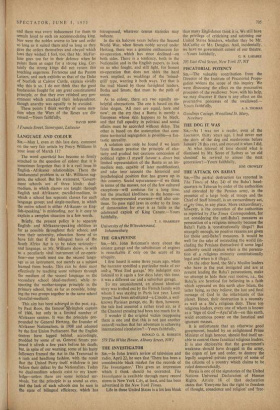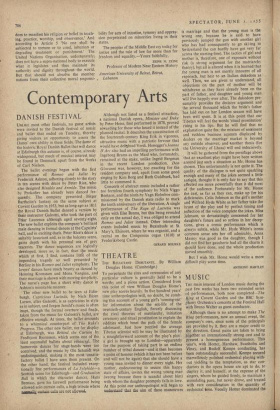THE 'ATTACK ON BAHAI
SIR,---Thc partial destruction (as reported in The Times. of May 24) of the Baha'i head- quarters in Teheran by order of the authorities and executed by the Persian army, in the presence' of a large body of troops and the Chief of Staff himself, is an extraordinary act, time, in any place. More extraordinary, atny however, is the contention of the authorities as reported by The Times Correspondent, for not considering the anti-Baha'i measures as persecution of a religious minority because the Baha'i Faith is 'constitutionally illegal' 1 But strangely enough, no positive reasons are given for those anti-Baha'i measures. It would be well for the sake of instructing the world (in- cluding the Persians themselves) if some legal authority could explain when is the persecu- tion of a religious minority constitutionally legal and when is it illegal.
On the other hand, the Shi'a Muslim leaders who have in the past instigated and are at present leading the Baha'i persecutions, make no attempt to hide their real motive, i.e., the Baha'is are heretical for believing in a faith which appeared on this earth after Islam, the latter being, as they believe, the last and final message of God to thc inhabitants of this planet. Hence, their destruction is a necessity as well as a Shi'a religious duty. These top religious leaders, every one of whom is known as a 'Sign of God'—Ayat'ul'ah--on this earth, wield enormous power on the fanatical and ignorant masses.
It is unfortunate that an otherwise good government, headed by an enlightened Prime Minister of high honour, should find itself un- dom to manifest his religion or belief in teach- ing, practice, worship, and observance.' And according to Article 5 'No one shall be subjected to torture or to cruel, inhuman or degrading treatment or punishment.' The United Nations Organisation, unfortunately, does not ha,ve a supra-national body to execute what it legislates and thus maintain its authority and dignity throughout the world. But that should not absolve the member nations from their collective moral responsi- bility for acts of injustice, tyranny and oppres- sion perpetrated on minorities living in their states.
The peoples of the Middle East cry today for justice and the rule of law far more than for freedom and equality.—Yours faithfully, ZEINE N. &me Professor of Modern Near Eastern History American University of Beirut, Beirut, Lebanon



































 Previous page
Previous page